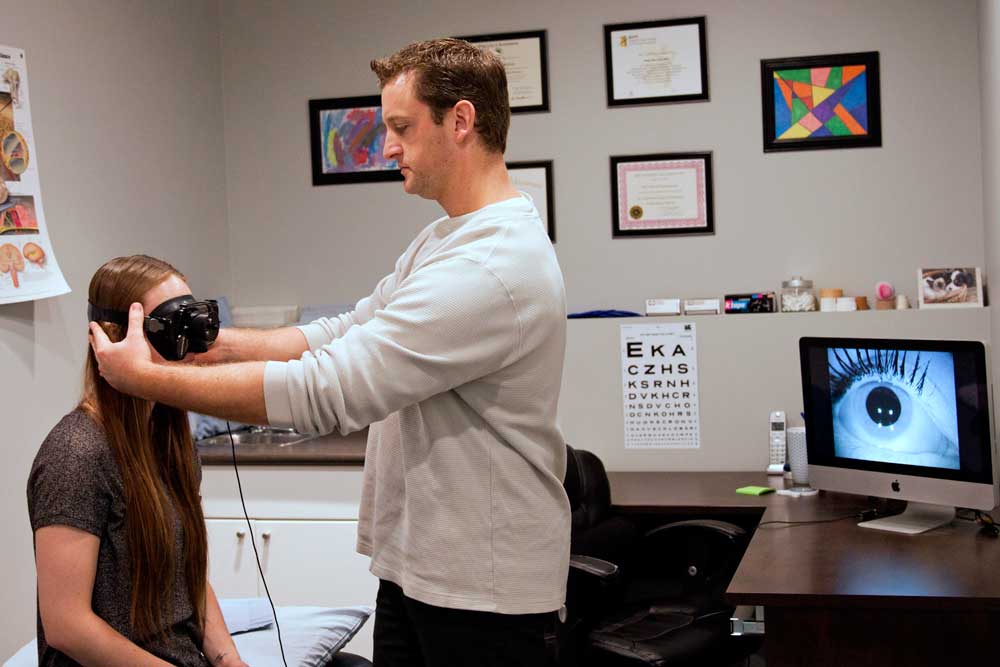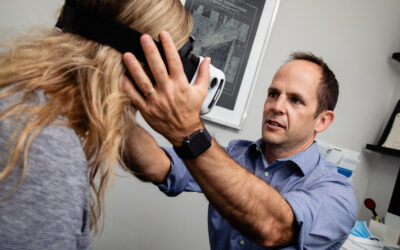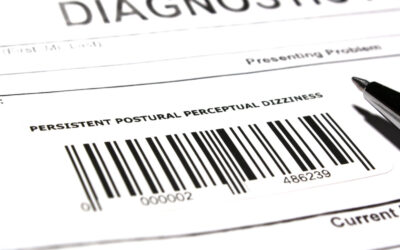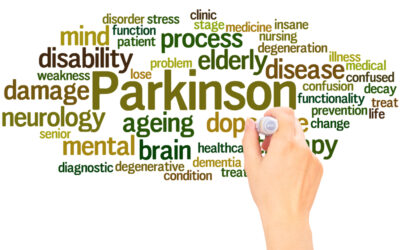Vestibular Therapy for Balance & Dizziness Treatment
Are you feeling dizzy or disoriented?
Issues with your balance? Is the world sometimes spinning? We want to help! North 49 Physical Therapy has Vestibular Therapy specialists that deal specifically with treating vertigo, dizziness and balance issues. Book an appointment online, today.
Get help with dizziness & vertigo
Contact us today to book an appointment, either in-person or via teleconferemce (video Zoom call). The therapists at North 49 Physiotherapy are specialists in treating vertigo, dizziness and loss of balance.
Your one hour assessment is performed with one of our team physical therapists who is also a certified vestibular therapist. The initial assessment includes a history taking, followed by a physical assessment consisting of an assessment of nerve function, mobility, balance, and if dizziness is an issue will also include VNG goggle testing. The initial treatment approach will depend on the findings. If the symptoms are dizziness the treatment may include particle positioning techniques, specific exercises, advice on lifestyle changes such as modifying your diet, and education. If balance is an issue treatment may include prescribing balance exercises, treating any associated dizziness, and/or by determining if the use of ambulatory aides are appropriate.
Follow-up appointments are approximately 30 minutes.
Dizziness
• Central nervous system: stroke, Multiple Sclerosis, concussion/brain injury, cerebellar atrophy, brain tumour, Chiari Malformation, vertebral artery insufficiency.
• Otological: Meniere’s Disease, Benign Paroxysmal Positional Vertigo (BPPV), vestibular neuronitis, and recurrent vestibulopathy.
• Psychiatric: anxiety/panic disorders, mood disorders
• Cardiovascular: arrhythmia, anemia, and postural hypotension
• Neck injuries
• Medication induced
• Metabolic: hypoglycaemia, hormonal
Balance
1. Impaired functioning of sensory systems, which include ones eyes; inner ear; and the nerve endings in the skin, muscles and joints. This may be due to: age related changes, a neurological or musculoskeletal deficit.
2. Being on multiple medications.
Dizziness or feeling unbalanced can happen to many people
Did you know…
• Dizziness and balance problems affect approximately 50% of the adult population, at some point in their life.
• Falls due to balance problems are the cause of 85% of all injuries requiring hospitalization in persons over 65 years of age.
What is Vestibular Therapy?
Vestibular physiotherapy addresses problems with your “Vestibular System”, and treatment typically addresses restoring proper balance and treating dizziness disorders.
Complaints of dizziness, if arising from the vestibular system, may be treated with particle positioning techniques, specific exercises, dietary guidelines and education, depending on the cause. We may prescribe appropriate balance exercises, treating the dizziness ambulatory aides are appropriate.

Your Vestibular Appointment:
Frequently Asked Questions (FAQ)
How long will my assessment take?
The initial assessment and consultation will take 1 hour.
Will I feel dizzy after the assessment?
Some patients may not have any symptoms after the initial assessment, but it is not uncommon for a patient to feel a bit off for the rest of the day.
Should I have someone come with me?
Yes. If you are being seen in regards to your dizziness you may feel a bit off after the assessment. It would therefore be good to have someone drive you home.
How many treatments will I need?
This will depend on the cause of your symptoms. If you have BPPV (the most common inner ear problem to cause dizziness) one to three treatments should resolve your symptoms, whereas, symptoms arising after an acquired brain injury (stroke, concussion, etc) may require follow-up over a period of months.
Will my appointments be covered through my Sask Health Benefits?
No, but they are typically covered through the Physical Therapy portion of the benefits package through you or your spouse’s work insurance, Blue Cross, or Group Medical Insurance. It should also be covered through your motor vehicle or worker’s compensation benefits if the problem is the result of a motor vehicle or work related injury.
Do I need to see my family doctor first?
Not necessarily, but it would be good to be seen by your family doctor first to rule out any cardiovascular or neurological problem that may be leading to your symptoms. Also, to be reimbursed through your insurance benefits you may need a doctors referral.
Learn more about treating Dizziness and Vertigo
What to Expect During Your Vestibular Assessment
If you're struggling with dizziness, you don't have to deal with it alone. At North 49, our vestibular assessment is designed to identify the cause...
What Is PPPD? Symptoms, Causes & Steps to Recovery
Have you ever felt off-balance, dizzy, or just not steady on your feet for weeks or even months? If so, you might have heard about Persistent...
Understanding Parkinson’s Disease: Symptoms & Who’s Affected
Parkinson’s disease (PD) is a progressive neurodegenerative disorder that affects movement and can lead to a wide range of physical, mental, and...
CONTACT & HOURS
Phone: 306-343-7776
Fax: 306-343-7780
Monday to Friday: 9am-6pm
Locally Owned & Operated



